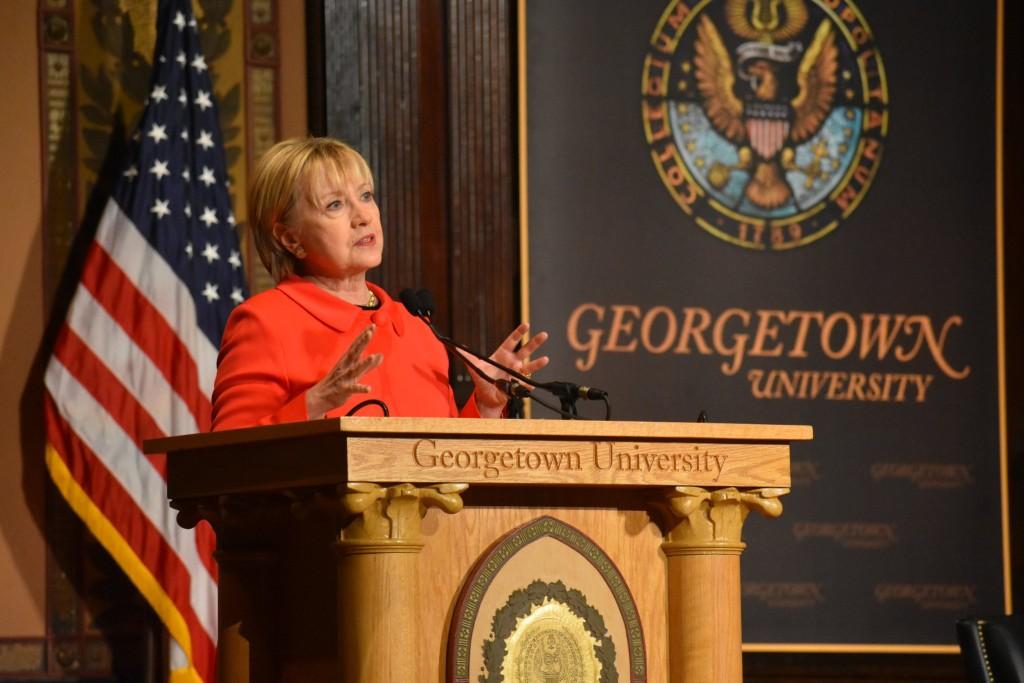
Former Secretary of State Hillary Clinton advocated continued American leadership abroad in a speech in Gaston Hall on Friday.
In one of her first speeches since the November election, former Secretary of State Hillary Clinton urged the United States to continue to lead worldwide peace efforts and advance the rights of women in a Gaston Hall speech on Friday.
“We have to ask, will we be left behind or will we continue to lead the way? I hope the answer is that we will do whatever it takes to make our country and the world stronger and more secure,” Clinton said. “Standing up for our values, for human rights and opportunities, security for all.”
The address, part of the awards ceremony for this year’s Hillary Rodham Clinton Award for Advancing Women in Peace and Security, also launched several critiques of President Donald Trump, including his administration’s claims of using “alternative facts.”
“Women are not inherently more peaceful than men,” Clinton said. “That is a stereotype. That belongs in the alternative.”
Throughout her address, Clinton advocated the spread of gender equity in the United States and other nations. Increased worldwide gender equity is in the United States’ best interests, according to Clinton.
“But — and this is what I want to really impress upon you — this is strategic and necessary for matters of peace, prosperity and security. It is not a partisan issue. It’s a human issue,” Clinton said. “A rising tide of women’s rights lifts entire nations.”
The Trump administration’s first budget, released March 16, proposed $54 billion in cuts to the federal government, including to the Department of State. This puts the United States’ success at risk, according to Clinton.
“This administration’s proposed cuts to international health, development and diplomacy would be a blow to women and children and a grave mistake for our country,” Clinton said.
According to Clinton, diplomacy, rather than military power, is the best path to ensure the United States’ security.
“These distinguished men and women who served in uniform recognize that turning our back on diplomacy won’t make our country safer,” Clinton said. “It will undermine our security and our standing in the world.”
Advocating gender equity, Clinton said, must be a focus of U.S. foreign policy resources.
“Standing up for the rights and opportunities of women and girls must be a cornerstone of American global leadership,” Clinton said. “And therefore, it must be woven throughout our foreign policy with the resources, staffing, accountability and attention needed to back up that commitment.”
The United States must also look to ensure that women are included in efforts to create a more peaceful world, according to Clinton.
“If we are to build more just, free and peaceful countries and indeed a world, it’s not enough just to pay lip service to empowering women,” Clinton said. “We have to take seriously their concerns and give them the tools to be equal partners in helping to shape the world they inhabit.”
Clinton also addressed the Middle East refugee crisis. About 5 million people have fled Syria since the start of the civil war in 2011, according to the United Nations High Commissioner for Human Rights. U.S. District Judge Derrick Watson extended a ruling March 31 blocking Trump’s second executive order temporarily barring immigration from six Muslim-majority countries for 90 days and suspending refugee resettlement for 120 days.
Clinton said the United States must play a role in supporting refugees.
“This is especially important now, when we have, across the globe, more than 60 million refugees fleeing not only conflicts, but famine and drought and disease,” Clinton said. “And we have to come to terms with that because, again, it’s not just somebody else’s problem.”
This year’s awards went to four individuals whose work ensured women played an active role in peace negotiations between the Colombian government and the Revolutionary Armed Forces of Colombia, a paramilitary group known as FARC.
The Colombian government and FARC signed a peace deal in November 2016, ending almost 50 years of conflict within Colombia.
Peace deals are most successful when women play a role in negotiations, according to Clinton.
“History does show that when women are at the peace table, they bring together coalitions and they work really hard to build consensus,” Clinton said. “And they are the ones most likely to shine a bright light on issues of human rights, transitional justice, national reconciliation and economic renewal.”
Georgetown Institute for Women, Peace and Security Executive Director Melanne Verveer (SFS ’66, GRD ’69), who served as ambassador-at-large for global women’s issues from 2009 to 2013, presented the award to former Vice President of Colombia and lead negotiator Humberto de la Calle, Colombia Deputy Attorney General Maria Paulina Riveros and Colombia Office of the High Commissioner for Peace Thematic Director Elena Ambrosi, who both played a key role in negotiations, and journalist Jineth Bedoya, who advocates against sexual violence.
Verveer said this year’s award looks to honor those who will play a role in creating peace and prosperity in Colombia.
“The torch of reconciliation rests with the women of Colombia,” Verveer said.
Clinton said the peace agreement will require effort from both sides to ensure it is successful.
“Now like so many peace agreements, as hard as it was to get to it after 50 years of war, it is just the first step,” Clinton said. “Implementing peace will be a constant task.”
Prior to the event, students started lining up at about 10:30 p.m. Thursday night for a seat inside Gaston Hall. Students were still waiting in line to enter Gaston Hall when doors closed at 10:20 a.m.
This post has been updated.




















